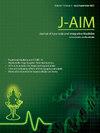Targeting cell cycle arrest in breast cancer by phytochemicals from Caryto urens L. fruit ethyl acetate fraction: in silico and in vitro validation
IF 1.9
Q3 INTEGRATIVE & COMPLEMENTARY MEDICINE
引用次数: 0
Abstract
Background
Caryota urens, also known as Shivjata, has been documented in ancient Indian texts for its therapeutic benefits, addressing conditions from seminal weakness to gastric ulcers. This study aims to investigate its contemporary medicinal potential in treating breast cancer.
Objectives
The study focuses on exploring the therapeutic potential of Caryota urens fruit against breast cancer, specifically targeting cell cycle genes CDK1, CDC25A, and PLK1 through bioinformatics, network pharmacology, and in vitro validation.
Materials and methods
Using mass spectrometry and nuclear magnetic resonance (NMR), 60 key phytoconstituents from Caryota urens fruit were identified. Bioinformatics analysis, integrating Gene Cards and GEO databases, 15,474 breast cancer-associated genes focusing on the HR+/HER2-subtype were identified. Molecular docking and qPCR validated the interactions of key phytoconstituents, particularly Episesamin, with CDK1, CDC25A, and PLK1. In vitro studies were conducted on the MCF7 cell line, supplemented by ROC and survival analyses to evaluate diagnostic and therapeutic potential.
Results
The bioinformatics analysis identified CDK1, CDC25A, and PLK1 as pivotal genes regulating cell cycle progression and breast cancer tumorigenesis. Network pharmacology and in vitro studies indicated that phytoconstituents, especially Episesamin, downregulated these genes in breast cancer cells. Molecular docking and qPCR confirmed these interactions, and ROC and survival analyses underscored their diagnostic and therapeutic significance.
Conclusions
This study suggests that Caryota urens fruit extract, particularly Episesamin, may inhibit breast cancer metastasis by downregulating CDK1, CDC25A, and PLK1, offering promising new strategies for targeting the cell cycle in breast cancer and emphasizing the value of integrating bioinformatics with experimental methods in cancer research.
从核桃果实乙酸乙酯部分提取的植物化学物质靶向乳腺癌细胞周期阻滞:硅和体外验证
在古印度文献中,也被称为Shivjata的仙人掌具有治疗作用,可以治疗从精液无力到胃溃疡的各种疾病。本研究旨在探讨其治疗乳腺癌的当代医学潜力。目的通过生物信息学、网络药理学和体外验证等方法,探索柚果对细胞周期基因CDK1、CDC25A和PLK1的治疗潜力。材料与方法采用质谱分析和核磁共振(NMR)技术,对柚果中的60种主要植物成分进行了鉴定。通过生物信息学分析,整合Gene Cards和GEO数据库,共鉴定出15474个以HR+/ her2亚型为主的乳腺癌相关基因。分子对接和qPCR验证了关键植物成分,特别是Episesamin与CDK1、CDC25A和PLK1的相互作用。在MCF7细胞系上进行了体外研究,并辅以ROC和生存分析来评估诊断和治疗潜力。结果生物信息学分析发现,CDK1、CDC25A和PLK1是调控细胞周期进程和乳腺癌肿瘤发生的关键基因。网络药理学和体外研究表明,植物成分,特别是Episesamin,在乳腺癌细胞中下调了这些基因。分子对接和qPCR证实了这些相互作用,ROC和生存分析强调了它们的诊断和治疗意义。结论本研究提示,鹿角果提取物,特别是Episesamin,可能通过下调CDK1、CDC25A和PLK1抑制乳腺癌转移,为乳腺癌细胞周期靶向提供了新的策略,强调了生物信息学与实验方法结合在癌症研究中的价值。
本文章由计算机程序翻译,如有差异,请以英文原文为准。
求助全文
约1分钟内获得全文
求助全文
来源期刊

Journal of Ayurveda and Integrative Medicine
INTEGRATIVE & COMPLEMENTARY MEDICINE-
CiteScore
4.70
自引率
12.50%
发文量
136
审稿时长
30 weeks
 求助内容:
求助内容: 应助结果提醒方式:
应助结果提醒方式:


